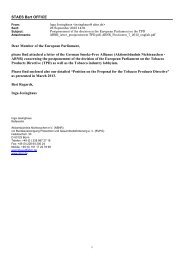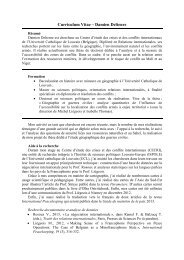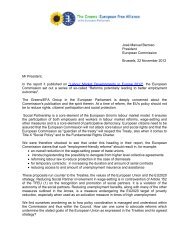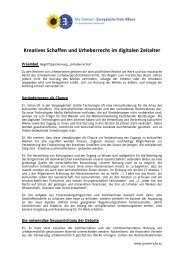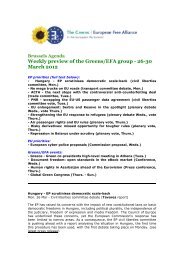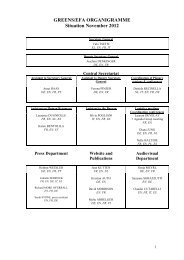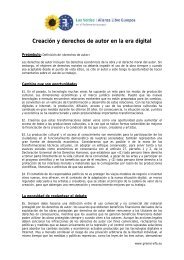Agro-Biotechnology: - The Greens | European Free Alliance
Agro-Biotechnology: - The Greens | European Free Alliance
Agro-Biotechnology: - The Greens | European Free Alliance
You also want an ePaper? Increase the reach of your titles
YUMPU automatically turns print PDFs into web optimized ePapers that Google loves.
28 | Cloned farm animals - a ‚killing application‘? | Cloning in farm animals potential benefits, products and players<br />
introduction of animal cloning for food production, concluding:<br />
“At present, the EGE does not see convincing arguments to justify the production<br />
of food from clones and their offspring.”<br />
4.3 Who benefits from the cloning of farm animals?<br />
Some companies marketing cloned farm animals were listed by Suk et al.,<br />
2007. Among those are four US companies, one from Australia, New Zealand<br />
and one from China. Companies in Japan and Europe are not listed. ViaGen<br />
and its partner TransOva is said to be responsible for most of the cloned animals<br />
in the US 29 . <strong>The</strong>y hold the rights on the patent that was originally granted<br />
for the creation of Dolly. According to ViaGen it costs at least US $15,000 to<br />
clone a cow and US $4,000 to clone a sow 30 .<br />
Table 1: Livestock biotech companies applying animal cloning for food production<br />
(Source: Suk et al., 2007)<br />
Company<br />
Location<br />
ViaGen<br />
Celentis<br />
Clone International<br />
Cyagra/in vitro Brazil/Goyaike<br />
Yangling Keyuan Cloning<br />
Trans Ova Genetics<br />
Minitube USA<br />
Austin, TX, USA<br />
Auckland, New Zealand<br />
Melbourne, Australia<br />
Elizabethtown, PA, USA/Mogi Mirim, Brazil/Escobar,<br />
Argentina<br />
Yangling, China<br />
Sioux Center, IA, USA<br />
Verona, WI, USA<br />
<strong>The</strong> list of companies is based on company contacts as well as internet searches. <strong>The</strong> industry dynamics<br />
in this sector is rapidly changing and this table should not be considerd either definitive or fully<br />
up to date.<br />
Taking a closer look at the expectations of the companies involved in cloning<br />
it becomes evident that their interest is not only in selling certain animals<br />
at high prices. Cloning is largely driven by intellectual property rights that<br />
give control over access to genetic material such as semen, embryos and animals.<br />
Analyses of patents show that patents filed on cloning technology also<br />
cover the animals and their genetic resources as part of the so-called invention.<br />
<strong>The</strong>refore cloning goes hand in hand with the introduction of exclusive intellec-<br />
29 http://www.reuters.com/article/idUSN127887120091113?loomia_ow=t0:s0:a49:g43:r1:c1.000000:b3<br />
0344402:z0<br />
30 http://www.reuters.com/article/idUSN127887120091113?loomia_ow=t0:s0:a49:g43:r1:c1.000000:b3<br />
0344402:z0



